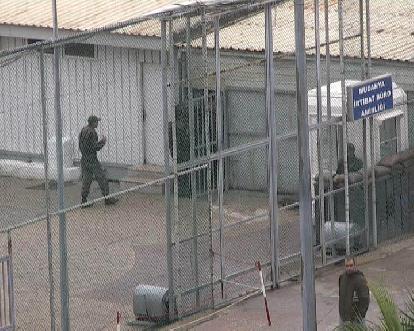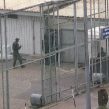
PKK Leader Abdullah Ocalan Challenges Omission from Peace Initiative from His Prison Cell
Publication: Terrorism Monitor Volume: 7 Issue: 37
By:

Turkey has been busy debating the recent initiative of the Justice and Development Party (Adalet ve Kalkinma Partisi – AKP) to end the long conflict between Turkish security forces and the Kurdistan Workers Party (Partiya Karkeren Kurdistan – PKK). On November 12, Turkish Interior Minister Besir Atalay, the coordinator of the Kurdish initiative, revealed the steps that the government is planning to take immediately. The government sees that democracy is the only solution to the problems in the region. With this perspective, the AKP government has formulated its initiative with six initial steps:
1.) Establishment of an independent human-rights institution to monitor human rights violations.
2.) Establishment of a commission to examine the policies and practices surrounding discrimination against minorities.
3.) Parliamentary ratification of the U.N. Convention against Torture and the creation of a national preventative mechanism.
4.) Establishment of an independent oversight agency tasked with receiving and investigating accusations of torture or mistreatment by the security forces.
5.) Renaming of residential areas in line with demands from local communities.
6.) Allowing political parties to communicate in languages other than Turkish during election campaigns (Hurriyet, November 13).
While listing these points, the government left the door open for further progress on the issue. At the final stage it may need to amend some articles in the constitution as well. As expected, the opposition parties have harshly criticized the Kurdish imitative. The Nationalist Action Party (Milliyetci Hareket Partisi – MHP) associates the plan directly with the PKK’s imprisoned leader, Abdullah Ocalan, and accuses the government of cooperating with terrorists (Hurriyet, November 17). The secularist Republican People’s Party (Cumhuriyet Halk Partisi – CHP) accused the government of showing weakness against the terrorists. Naturally the political quarrel between the major opposition parties and the government has inflamed the debate and escalated the nationalist confrontation between the Turks and Kurds.
The Island Prisoner
At the other end of the spectrum, the PKK constantly asks the government to ease the harsh prison conditions of its founder, Abdullah Ocalan. Since 1999, Ocalan has been held alone in a maximum security prison on Imrali Island in the Marmara Sea. He has the opportunity to meet with his lawyers on a weekly basis, however, because he is held on an island, many weeks often pass in winter when weather conditions do not permit his lawyers to visit the island. Due to his “undisciplined” actions inside the prison, officials punish him from time to time with “absolute isolation,” during which time he is permitted no visitors.
The Turkish government has promised the European Court and the European Committee for the Prevention of Torture (CPT) to change the conditions of isolation. The CPT recommended that Turkish authorities "take immediate steps to find means of ensuring that Abdullah Ocalan’s right to receive visits from his relatives and lawyers is fully effective in practice.” In addition, the CPT has asked that Abdullah Ocalan "should at the earliest opportunity be integrated into a setting where contacts with other inmates and a wider range of activities are possible.” [1]
To meet the requests of the CPT and the PKK, the Turkish government has built a new prison facility on Imrali Island and transferred five other inmates there (Zaman, November 18). The timing of the inmate transfers to Imrali Island was thought to be a gesture by the government to show its sincerity in the Kurdish initiative, yet Ocalan did not like his new accommodations. Through his relatives and lawyers, Ocalan shared his view that the new facility was “worse than the previous conditions” (Radikal, November 19). The Turkish press reported that the new prison was built according to international standards, which allow Ocalan a seven meter square cell, a toilet and shower. His previous cell was around 13 square meters. Unlike the old prison, the new facility has units allowing Ocalan to meet with his family members and lawyers (Radikal, November 19). The structure of the new prison meets with the CPT criteria; however Ocalan claims that the new prison conditions create many health problems, including shortage of breath (Ajansa Nuceyan a Firate, November 27).
Ethnic Tensions Erupt
While the opposition parties are agitating the Turkish public against the Kurdish initiative, the Kurdish nationalist Democratic Society Party (Demokratik Toplum Partisi – DTP) has organized several political rallies to protest Ocalan’s new prison conditions, further escalating the division between the Turkish and Kurdish people. In Diyarbakir, five thousand people answered the DTP’s call to protest Ocalan’s prison conditions (Radikal, November 26). Because of the intensified debate on Turkish and Kurdish nationalism, the two peoples are at the edge of a bloody confrontation. On November 22, the DTP organized a party convoy to tour the city of Izmir where Turkish nationalists and Kurdish immigrants live together. The DTP convoy was stopped by a few young Turkish nationalists, sparking a sudden confrontation between DTP supporters and the people of Izmir. The DTP convoy was stoned and three people were injured (Radikal, November 22). On November 26, in the town of Baramic in Canakkale province (another coastal city located in the western part of the country where Kurds and Turks live together), a quarrel between Kurdish and Turkish youths immediately incited a large-scale reaction against Kurdish minorities in the town. Police arrested four Kurdish teenagers. As the news of the clashes spread, thousands of people gathered in front of the police station, demanding the release of the Kurdish teenagers so that they could lynch them (Sabah, November 26).
The public unrest sparked protests and demonstrations organized by pro-Kurdish DTP supporters in the ethnic-Kurdish regions of the eastern part of the country.
The ethnic confrontations ended in two days; however, tension still exists in the country (ntvmsnbc.com, December 1). Hundreds of Kurdish people took to the streets in the shantytowns of Istanbul, tossing Molotov cocktails at buses and cars to support Ocalan. In Mersin, pro-PKK shop owners closed their shops to support county-wide demonstrations against Ocalan’s new prison conditions (Ajansa Nuceyan a Firate, November 30).
The most worrying incident was the confrontation in Diyarbakir between pro-PKK supporters and supporters of the Kurdish Hizbullah group, which opposes the PKK’s socialist orientation. On November 29, a group of PKK supporters gathered there and tossed Molotov cocktails at the offices of Sura-Der, a pro-Hizbullah association. In response, a thousand Hizbullah supporters got together and protested against the PKK (NTV, December 1). Considering the bloody history of clashes between the Hizbullah and the PKK in the 1990s, the possibility of a new confrontation between the two organizations alarms security institutions.
Between 1993 and 1995, roughly 700 people lost their lives during armed clashes between the two organizations. The main reason behind the bloodshed was the PKK’s desire to be the only Kurdish nationalist organization in the region. In 1993, the PKK offered Hizbullah an opportunity to join the PKK to fight against the Turkish state, which both organizations view as the enemy. Hizbullah rejected the offer as it regards the PKK as an organization of infidels whose political program is inconsistent with Hizbullah’s desire to establish an Islamic Kurdistan. Hizbullah leaders argue that, because the PKK is a secular organization, it is something similar to the secular Turkish state.
Seeking International Support for Ocalan
In addition to the street protests, PKK leaders have released statement after statement warning the government about Ocalan’s prison conditions. The Kurdistan Democratic Confederation (Koma Civaken Kurdistan – KCK) issued a statement saying the “attacks” against Ocalan show that the intention of the Turkish government is to eliminate the PKK leader. “This is a war project against Ocalan and our organization and the Kurdish people. If Ocalan is not released from the ‘death cell’ where he was put, our organization is not responsible for further developments.” (Ajansa Nuceyan a Firate, November 30).
Ocalan supporters have now taken their campaign to international human rights institutions. On that front, a petition campaign has been launched asking Amnesty International and the CPT to take action against the Turkish government. The petition states:
“That Abdullah Ocalan’s death sentence was abolished was good news for everyone, but that the sentence was replaced by torture and painful isolation, which may be called a ‘white execution,’ is an inhumane fact which your organizations should not accept and therefore do everything in your power to both deter and prevent (gopetition.com, November 29).
Conclusion
Although pro-PKK supporters claim they are protesting Ocalan’s new prison conditions, in reality the protests are related to the government’s Kurdish initiative. The PKK and the DTP are asking the government to recognize Ocalan as a peacemaker. The expectation was that the government could negotiate with Ocalan in return for better prison conditions outside Imrali Island and after a few years possibly offer him an amnesty. In fact, Ocalan still maintains his key position for any peace project; however, perhaps because of the fierce opposition from the Turkish nationalist parties, the AKP government does not want to include Ocalan in any part of the Kurdish initiative other than meeting the requirements of the CPT regarding the confinement of the PKK leader. More importantly, the political situation in the country is forcing the AKP government to move forward to the end. Any setback in the current initiative could bring political devastation for the AKP government. Perhaps calculating the political situation, Ocalan, through mass protests in every corner of the country, wants to show the AKP government and the security institutions that he is still the key person to deal with in bringing peace to the country.
Notes:
1. Report to the Turkish Government on the visit to Turkey carried out by the European Committee for the Prevention of Torture and Inhuman or Degrading Treatment or Punishment (CPT), May 19 – 22, 2007, https://www.cpt.coe.int/documents/tur/2008-13-inf-eng.htm.





